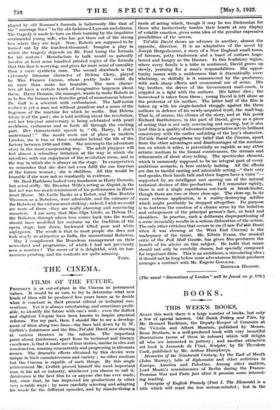THE CINEMA.
FILMS OF THE FUTURE.
PROPHECY IS as out-of-place in the Cinema as permanent values. It would be as vain to try to determine what new kinds of films will be produced five years hence as to decide what is constant in their present ethical or technical con- ventions. Yet it is always entertaining, and sometimes profit- able, to identify the future with one's wish : even the dullest and slightest Utopias have been known to inspire practical reforms. For my part, then, I should like to see a develop- ment of films along two lines—the lines laid down by D. W. Griffith's Intolerance and the film, Torable David, now showing at various theatres in the suburbs. The important point about Intolerance, apart from its technical and literary excellence, is that it made use of four stories, similar in idea and construction, running concurrently and progressing in alternate scenes. The dramatic effects obtained by this device were unique in their cumulativeness and variety ; no other medium but the Cinema is capable of such things. By this single achievement Mr. Griffith proved himself the most important man in his art or industry, whichever you choose to call it. Intolerance is the best film he or anyone else has ever made, but, since that, he has improved his productions in other very notable ways : by more carefully selecting and adapting his music for the different episodes, and by standardizing a
mode of acting which, though it may be too Dickensian for those who instinctively harden their hearts at any display of volatile emotion, gives some idea of the peculiar expressive possibilities of the screen.
Tor able David shows an advance in another, almost the opposite, direction. It is an adaptation of the novel by
Joseph Hergesheimer, a story of a New England small town, of farmers, petty tradesmen and a band of outlaws huge.. boned and hungry as the Doones. In this feudatory region, where every family is a tribe in sentiment, David grows up slowly, yearning for a man's responsibilities. His oppor- tunity comes with a suddenness that is dramatically over- whelming, so skilfully is it manoeuvred by the producers, with such sharp effects and economical use of scene. His
big brother, the driver of the Government mail-coach, is crippled in a fight with the outlaws. His father dies ; the
homestead is taken from them ; young David is left alone as the protector of his mother. The latter half of the film is taken up with his single-handed struggle against the three outlaws in defence of his newly-acquired trust, the mail-bag.
That is, of course, the climax of the story, and at this point Richard Barthelmess, in the part of David, gives us a piece of acting that is not only convincing and moving, but is also (and this is a quality of advanced interpretative art) in brilliant consistency with the earlier unfolding of the boy's character.
Torable David strengthens my belief that the Cinema, apart
from the other advantages and disadvantages of the mechan- ism on which it relies, is potentially as capable as any other artistic medium in the formal contrivances, the stresses and refinements of sheer story-telling. The spectacular element, which is commonly supposed to be an integral part of every ambitious scenario, is here entirely lacking. All the effects are due to tactful casting and admirable acting—" their very nod speaks, their hands talk and their fingers have a voice "-
supported by an intelligent and sparing use of the natural technical devices of film production. If I remember rightly, there is not a single superfluous cut-back or break-leader, though there are two or three close-ups. The close-up, in its more extreme application,' is a reality-destroying artifice which might profitably be dropped altogether. Its purpose is to buttress the emotion of a climax scene by the isolation and enlargement of the principal person's face, or head and shoulders. In practice, such a deliberate disproportioning of a scene invariably results in a serious dislocation of the action. The only other criticism that occurs to me (I saw Tor able David when it was showing at the West End Cinema) is the inadequacy of the music. Mr. Edwin Evans, the musical critic of the Pall Mall -Gazette, has given film-producers the benefit of his advice on this subject. He holes that music should net only be carefully chosen, but specially composed for important films. This is an ambitious, a stimulating idea I it should not be long before some adventurous British producer arranges a contract with Mr. Eugene Goossens.
BERTRAM IIIIGOINS.














































 Previous page
Previous page